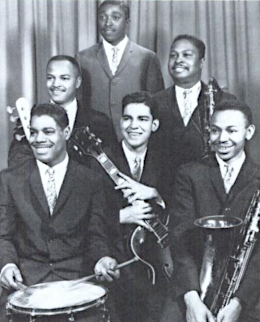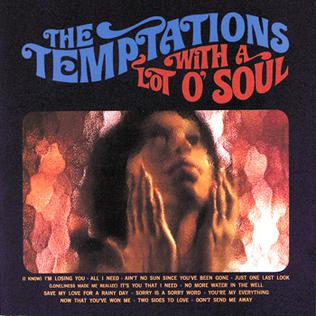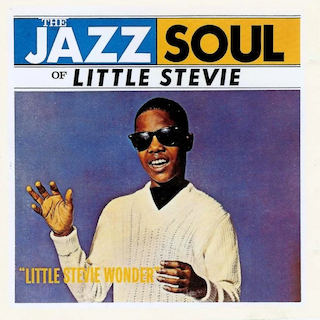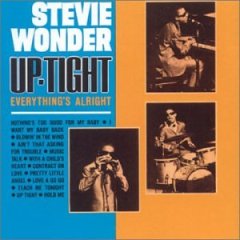Tribute to Uncle Ray
Last updated| Tribute to Uncle Ray | ||||
|---|---|---|---|---|
 | ||||
| Studio album by | ||||
| Released | October 1962 | |||
| Recorded | 1962 | |||
| Studio | Studio A, Hitsville USA, Detroit | |||
| Genre | Jazz pop [1] | |||
| Length | 31:13 | |||
| Label | Tamla | |||
| Producer | Henry Cosby, Clarence Paul | |||
| Little Stevie Wonder chronology | ||||
| ||||
| Review scores | |
|---|---|
| Source | Rating |
| Allmusic | |
| Tom Hull | B [3] |
| New Record Mirror | |
Tribute to Uncle Ray is the second studio album by Little Stevie Wonder, released by Motown in October 1962, shortly after The Jazz Soul of Little Stevie . Even though it was released second, it had been recorded first, when Wonder was just 11 years old. [5] The album was an attempt by Berry Gordy and Motown to associate the young "Little Stevie Wonder" with the successful and popular Ray Charles who was also a blind African American musician. [6] Like his debut, this album failed to generate hit singles as Motown struggled to find a sound to fit Wonder, who was just 12 when this album was released.
Track listing
All songs composed by Ray Charles, except where indicated.
- Side one
- "Hallelujah I Love Her So" – 2:28
- "Ain't That Love" – 2:42
- "Don't You Know" – 3:03
- "(I'm Afraid) The Masquerade Is Over" (Herbert Magidson, Allie Wrubel) – 4:19
- "Frankie & Johnny" (Traditional; arranged by Clarence Paul) – 2:51
- Side two
- "Drown in My Own Tears" (Henry Glover) – 4:01
- "Come Back Baby" – 2:50
- "Mary Ann" – 2:59
- "Sunset" (Stevie Wonder as Stevie Judkins, Clarence Paul) – 3:32
- "My Baby's Gone" (Berry Gordy, Jr.) – 2:28
Related Research Articles

Stevland Hardaway Morris, known professionally as Stevie Wonder, is an American singer-songwriter, musician, and record producer. He is credited as a pioneer and influence by musicians across a range of genres that include R&B, pop, soul, gospel, funk, and jazz. A virtual one-man band, Wonder's use of synthesizers and other electronic musical instruments during the 1970s reshaped the conventions of contemporary R&B. He also helped drive such genres into the album era, crafting his LPs as cohesive and consistent, in addition to socially conscious statements with complex compositions. Blind since shortly after his birth, Wonder was a child prodigy who signed with Motown's Tamla label at the age of 11, where he was given the professional name Little Stevie Wonder.

William "Smokey" Robinson Jr. is an American R&B and soul singer, songwriter, record producer, and former record executive. He was the founder and frontman of the pioneering Motown vocal group the Miracles, for which he was also chief songwriter and producer. He led the group from its 1955 origins, when they were called The Five Chimes, until 1972, when he retired from the group to focus on his role as Motown Records vice president. Robinson returned to the music industry as a solo artist the following year. He left Motown in 1999.
Motown is an American record label owned by the Universal Music Group. It was founded by Berry Gordy Jr. as Tamla Records on January 12, 1959, and incorporated as Motown Record Corporation on April 14, 1960. Its name, a portmanteau of motor and town, has become a nickname for Detroit, where the label was originally headquartered.

The Funk Brothers were a group of Detroit-based session musicians who performed the backing to most Motown recordings from 1959 until the company moved to Los Angeles in 1972.

Syreeta Wright, who recorded professionally under the mononym Syreeta, was an American singer-songwriter, best known for her music during the early 1970s through the early 1980s. Wright's career heights were songs in collaboration with her ex-husband Stevie Wonder and musical artist Billy Preston.

The Supremes A' Go-Go is the ninth studio album released by Motown singing group the Supremes. It was the first album by an all-female group to reach number-one on the Billboard 200 album charts in the United States.
The Originals, often called "Motown's best-kept secret", were a successful Motown R&B and soul group during the late 1960s and the 1970s, most notable for the hits "Baby I'm for Real", "The Bells", and the disco classic "Down to Love Town." Formed in 1966, the group originally consisted of baritone singer Freddie Gorman, tenor/falsetto Walter Gaines, and tenors C. P. Spencer and Hank Dixon. Ty Hunter replaced Spencer when he left to go solo in the early 1970s. They had all previously sung in other Detroit groups, Spencer having been an original member of the (Detroit) Spinners and Hunter having sung with the Supremes member Scherrie Payne in the group Glass House. Spencer, Gaines, Hunter, and Dixon were also members of the Voice Masters. As a member of the Holland–Dozier–Gorman writing-production team, Gorman was one of the co-writers of Motown's first number 1 pop hit "Please Mr. Postman", recorded by the Marvelettes. In 1964 the Beatles released their version and in 1975 the Carpenters took it to number 1 again. This was the second time in pop history that a song had reached number 1 twice as "The Twist" by Chubby Checker, reached number 1 in both 1960 and 1961. In 2006, "Please Mr. Postman" was inducted into the Songwriters Hall of Fame.

Diana & Marvin is a duets album by American soul musicians Diana Ross and Marvin Gaye, released October 26, 1973 on Motown. Recording sessions for the album took place between 1971 and 1973 at Motown Recording Studios in Hollywood, California. Gaye and Ross were widely recognized at the time as two of the top pop music performers.

The Temptations with a Lot o' Soul is the fifth studio album by The Temptations for the Gordy (Motown) label released in 1967. Featuring four hit singles, With a Lot o' Soul is the most successful Temptations album from their "classic 5" era, during which David Ruffin, Eddie Kendricks, Paul Williams, Melvin Franklin, and Otis Williams constituted the Temptations' lineup.

Diana Ross & the Supremes Join the Temptations is a collaborative album combining Motown's two best selling groups, Diana Ross & the Supremes and the Temptations. Issued by Motown in late 1968 to coincide with the broadcast of the Supremes/Temptations TCB television special, the album was a success, reaching #2 on the Billboard 200. Diana Ross & the Supremes Join the Temptations spent four weeks at number one on the UK Albums Chart.

Where Did Our Love Go is the second studio album by Motown singing group the Supremes, released in 1964. The album includes several of the group's singles and B-sides from 1963 and 1964. Included are the group's first Billboard Pop Singles number-one hits, "Where Did Our Love Go", "Baby Love", and "Come See About Me", as well as their first Top 40 hit, "When the Lovelight Starts Shining Through His Eyes", and the singles "A Breathtaking Guy" and "Run, Run, Run".

Meet the Supremes is the debut studio album by The Supremes, released in late 1962 on Motown.

The Jazz Soul of Little Stevie is the debut studio album by Little Stevie Wonder, released in September 1962 on the Tamla Motown label.

Recorded Live: The 12 Year Old Genius is the first live album by Little Stevie Wonder. The album was released on the Tamla record label in May 1963, the same month as the single release of "Fingertips". "Fingertips" topped both the Billboard Hot 100 chart and the R&B Singles chart, and Recorded Live: The 12 Year Old Genius topped the Billboard 200, all of which happened in 1963. This is the last album to use the "Little" in Stevie Wonder's name. Starting with the next album, he would go by just "Stevie Wonder." Wonder was the second and youngest solo artist to chart on the Billboard Top LPs under the age of 18. He was only 13 years old when that occurred.

With a Song In My Heart is the third studio album by Stevie Wonder, released in 1963 on the Tamla (Motown) label. The album was the first to drop Wonder's Little nickname as the 13-year-old singer went the same route of his label mate Marvin Gaye and covered a set of standards. Like Gaye and other Motown acts, label president Berry Gordy wanted all of his artists to be established on a crossover basis. The album did not immediately spell success for Wonder on the adult contemporary set. Veteran jazz arranger Ernie Wilkins arranged and conducted the album.

Up-Tight is a 1966 album by American singer Stevie Wonder, released by Motown on the Tamla label. It was his fifth studio release.

The Supremes Sing Country, Western & Pop is the fourth studio album recorded by the Supremes, issued by Motown in February 1965. The album was presented as a covers/tribute album of country songs, as Ray Charles had done with his album Modern Sounds in Country and Western Music. However, over half of the selections on The Supremes Sing Country, Western & Pop were written in-house by Motown staffer Clarence Paul. One of the songs on the album is "My Heart Can't Take It No More", which the Supremes had recorded in 1962 and released in 1963 as a single.

The Complete Stevie Wonder is a digital compilation featuring the work of Stevie Wonder. Released a week before the physical release of A Time to Love, the set comprises almost all of Wonder's officially released material, including single mixes, extended versions, remixes, and Workout Stevie Workout, a 1963 album which was shelved and replaced by With a Song in My Heart. The set also contains a digital (PDF) booklet and three music videos: "Overjoyed", "Part-Time Lover" and "So What the Fuss".

"Pops, We Love You " is a 1978 single recorded and released by Motown stars Diana Ross, Marvin Gaye, Smokey Robinson and Stevie Wonder, as a tribute to Berry "Pops" Gordy Sr., father of Motown founder Berry Gordy, who had died that year from cancer.
Anna Ruby Gaye was an American businesswoman, composer and songwriter. An elder sister of Motown founder Berry Gordy, she became a record executive in the mid-to-late 1950s distributing records released on Checker and Gone Records before forming the Anna label with Billy Davis and her sister Gwen Gordy Fuqua. Gordy later became known as a songwriter for several hits including the Originals' "Baby, I'm for Real", and at least two songs on Marvin Gaye's What's Going On album. The first wife of Gaye, their turbulent marriage later served as inspiration for Gaye's 15th studio album, Here, My Dear.
References
- ↑ Breihan, Tom (November 15, 2022). "The Supremes - "Where Did Our Love Go". The Number Ones: Twenty Chart-Topping Hits That Reveal the History of Pop Music. New York: Hachette Book Group. p. 56.
- ↑ Allmusic review
- ↑ Hull, Tom (November 2013). "Recycled Goods (#114)". A Consumer Guide to the Trailing Edge. Tom Hull. Retrieved June 20, 2020.
- ↑ Watson, Jimmy (14 September 1963). "Little Stevie Wonder: Tribute To Uncle Ray" (PDF). New Record Mirror . No. 131. p. 10. Archived from the original (PDF) on 8 April 2022. Retrieved 6 August 2022.
- ↑ Bob Gulla (2008). Icons of R&B and Soul. Greenwood Publishing Group. p. 314. ISBN 9780313340468.
- ↑ Ribowsky, Mark. Signed, Sealed and Delivered: The Soulful Journey of Stevie Wonder
Text is available under the CC BY-SA 4.0 license; additional terms may apply.
Images, videos and audio are available under their respective licenses.